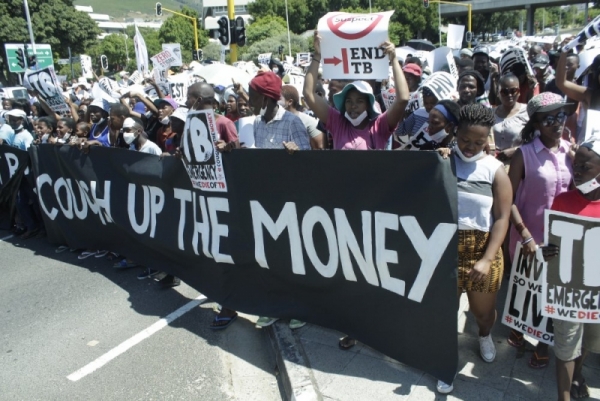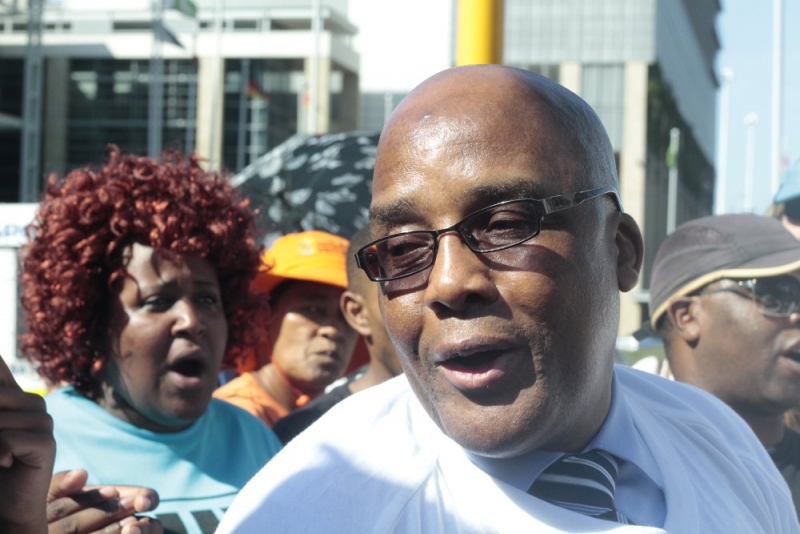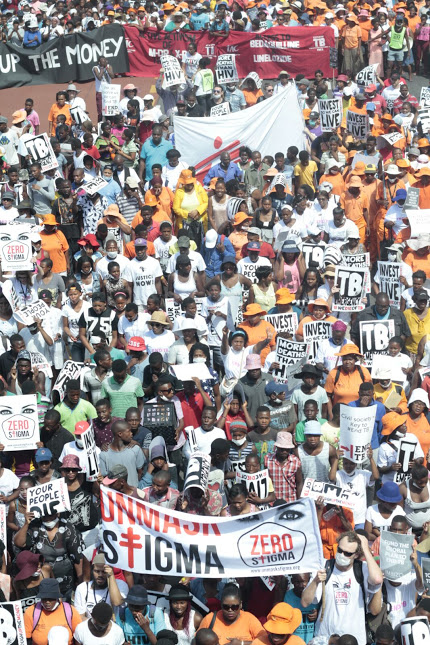

Photo by Masixole Feni.
3 December 2015
“Cough up money” for tuberculosis (TB) was the main demand of over a thousand people who marched from Keizersgracht Street to the Cape Town International Convention Centre (CTICC) this afternoon. The CTICC is hosting the 46th Union World Conference on Lung Health, the planet’s main annual TB meeting.
Minister of Health Aaron Motsoaledi accepted the march memo. He thanked the march participants and promised to respond to memo’s demands.
The march was organised by the Treatment Action Campaign (TAC) and supported by many other organisations, including Medecins Sans Frontieres, Sonke Gender Justice and the Social Justice Coalition. Many of the marchers have been ill with TB or had family members who have been sick or died from the disease.
Nokuphumla Zintso says two of her grandchildren have had TB. One is still on treatment. “We are here to fight TB. We want it to be prioritised,” she said.
Songo Gayo said his mother had TB for many years and he was at the march to empower people who have TB. “We want to tell people that it is curable. No one should have to be ashamed for having it. But also we want the government to put more money into TB because our people are dying especially in the townships,” he said.
 Minister of Health Aaron Motsoaledi accepted the memo from the marchers. Photo by Masixole Feni.
Minister of Health Aaron Motsoaledi accepted the memo from the marchers. Photo by Masixole Feni.
Doctors who have had TB, from an organisation called TB Proof, also participated in the march. One TB Proof’s members, Dr Thato Mosidi, told the marchers her story. She contracted extensively drug resistant TB after working in a high risk TB area. “We want to unmask the stigma because there is so much stigma associated with TB for everyone. It is what is driving the epidemic. People don’t want to get tested because it’s associated with HIV. It’s associated with being poor,” she said.
She explained that TB can happen to anyone, because it is airborne.
 Photo by Masixole Feni.
Photo by Masixole Feni.
TAC Western Cape Chairperson Nompumelelo Mantangane, who is also a nurse, explained that the purpose of the march is to create awareness that TB should be treated as an emergency. She said that many people are dying of the [drug-resistant form of the] disease because the medicines and diagnostics used to treat the disease are old. She explained that the drugs used to treat drug-resistant TB are toxic.
This was the rationale behind the first demand on the memo: All the BRICS countries (Brazil, Russia, India, China and South Africa) plus Indonesia must at least triple their investment in TB research from 2015 to 2016. The memorandum states, “We consider this reasonable since all these countries are contributing less than their fair share to the current global investment of $0.7bn per year – which is a third of the required $2bn.”
Other demands were that the United States must at least maintain its current research investment into TB and that the European Union, particularly Germany, must increase theirs. The memo also called upon the South African government to declare TB an emergency.
TB is the largest cause of recorded deaths in South Africa. It has been made worse by the HIV epidemic. Although most people who get treated in time can be cured with a relatively easy six-month drug regimen, an increasing number of patients have drug-resistant TB. They have to be treated with a cocktail of drugs, most of which have been poorly tested and have terrible side effects.